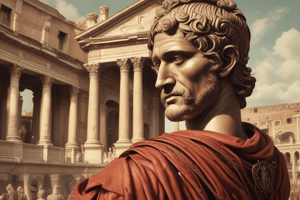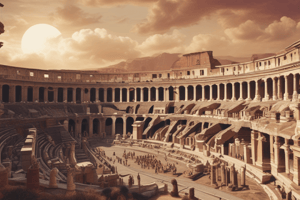Podcast
Questions and Answers
The traditional founding for Rome was in ______ BCE.
The traditional founding for Rome was in ______ BCE.
753
In 509 BCE, the native population expelled the ______ King.
In 509 BCE, the native population expelled the ______ King.
tarquin
In 450 BCE, major class conflict led to the writing of the ______ tablets.
In 450 BCE, major class conflict led to the writing of the ______ tablets.
12
The Punic Wars occurred between ______ BCE and 146 BCE.
The Punic Wars occurred between ______ BCE and 146 BCE.
Cato emphasized that 'Carthage must be ______.'
Cato emphasized that 'Carthage must be ______.'
In 120 BCE, Tiberius and Gaius Gracchus were assassinated for advocating land reforms for the ______.
In 120 BCE, Tiberius and Gaius Gracchus were assassinated for advocating land reforms for the ______.
In 60 BCE, Caesar, Pompey, and Crassus formed the first ______.
In 60 BCE, Caesar, Pompey, and Crassus formed the first ______.
In 49 BCE, Caesar crossed the ______ river, leading to a civil war.
In 49 BCE, Caesar crossed the ______ river, leading to a civil war.
Flashcards
Founding of Rome
Founding of Rome
The founding of Rome is traditionally dated to 753 BCE, located in Italy.
Rise of Roman Republic
Rise of Roman Republic
The Roman Republic rose to power due to factors such as a volunteer army, effective organization, lawmaking, military prowess, engineering skills, and representation.
Expulsion of the Tarquin King
Expulsion of the Tarquin King
The expulsion of the Tarquin King in 509 BCE marked the beginning of the Roman Republic and a deep-seated aversion to monarchy.
Classes and Representation in the Roman Republic
Classes and Representation in the Roman Republic
Signup and view all the flashcards
The Punic Wars
The Punic Wars
Signup and view all the flashcards
Decline of the Roman Republic
Decline of the Roman Republic
Signup and view all the flashcards
Assassination of Gracchus Brothers
Assassination of Gracchus Brothers
Signup and view all the flashcards
Marius's Standing Army
Marius's Standing Army
Signup and view all the flashcards
Study Notes
Founding and Rise of the Roman Republic
- Rome founded in 753 BCE in Italy.
- Factors contributing to the rise of the Roman Republic included: volunteer army, effective organization, lawmaking, military strength, engineering skills, and representative government.
- In 509 BCE, Romans expelled the last king, Tarquin, marking the start of the Republic and a long-standing dislike of monarchy.
- The concept of a republic, with its emphasis on civic virtue and representative government, began to take hold.
Class Conflict and Early Republic Institutions
- In 450 BCE, significant class conflict arose, culminating in the plebeian revolt.
- Twelve Tables were created as a response to the revolt, outlining the laws and rights of different social classes. This highlighted the divisions between patricians and plebeians.
- The Senate, predominantly composed of patricians, held lawmaking power.
- The Tribune, a single person, possessed veto power representing plebeians.
- The Tribal Assembly represented the common people.
The Punic Wars and Turning Point
- The Punic Wars (246-146 BCE) were a major turning point in the Republic.
- Key figures involved included Hannibal (Carthaginian general, enemy of Rome) and Scipio Africanus (Roman general who defeated Hannibal).
- Cato the Elder advocated for the destruction of Carthage.
- In 146 BCE, Rome emerged victorious and began its empire-building endeavors.
Decline of the Roman Republic
- Factors contributing to the decline of the Republic included:
- Increased power of generals, shifting loyalty from the state to individual military leaders.
- The wealth and slaves acquired through success concentrated into a small elite, creating social inequality.
- The rise of latifundia (large estates) that displaced small farmers and contributed to unemployment.
- Political violence intensified:
- Assassination of Tiberius and Gaius Gracchus in 120 BCE for proposing land reforms and grain distribution to the poor. This highlighted political conflict and violence.
- In 110 BCE, Marius established a standing army composed of poor citizens, breaking tradition and serving as consul multiple times.
Rise of the Triumvirate and Civil War
- In 60 BCE, the First Triumvirate formed, comprising Pompey (skilled general), Crassus (wealthy), and Caesar (talented general).
- Caesar's conquests in Gaul significantly expanded Rome's territory.
- In 49 BCE, Caesar crossed the Rubicon River triggering a civil war.
- Caesar was assassinated in 44 BCE.
The Roman Empire
- Following 15 years of conflict, Octavian and Antony emerged victorious.
- Octavian became the first Roman Emperor, marking the beginning of the Roman Empire and a period of peace.
Studying That Suits You
Use AI to generate personalized quizzes and flashcards to suit your learning preferences.




